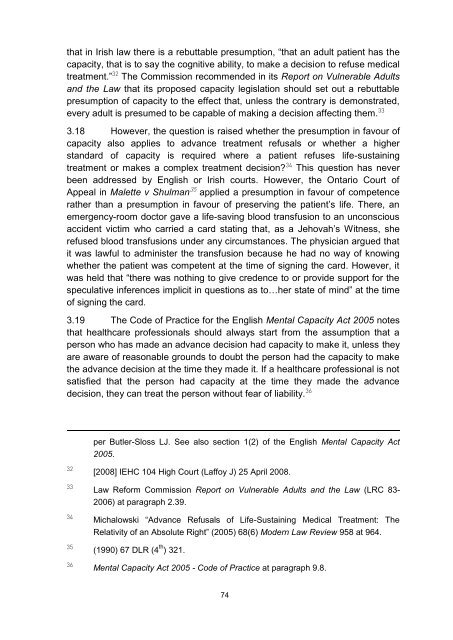Consultation Paper on Bioethics - Law Reform Commission
Consultation Paper on Bioethics - Law Reform Commission
Consultation Paper on Bioethics - Law Reform Commission
Create successful ePaper yourself
Turn your PDF publications into a flip-book with our unique Google optimized e-Paper software.
that in Irish law there is a rebuttable presumpti<strong>on</strong>, “that an adult patient has the<br />
capacity, that is to say the cognitive ability, to make a decisi<strong>on</strong> to refuse medical<br />
treatment.” 32 The Commissi<strong>on</strong> recommended in its Report <strong>on</strong> Vulnerable Adults<br />
and the <strong>Law</strong> that its proposed capacity legislati<strong>on</strong> should set out a rebuttable<br />
presumpti<strong>on</strong> of capacity to the effect that, unless the c<strong>on</strong>trary is dem<strong>on</strong>strated,<br />
every adult is presumed to be capable of making a decisi<strong>on</strong> affecting them. 33<br />
3.18 However, the questi<strong>on</strong> is raised whether the presumpti<strong>on</strong> in favour of<br />
capacity also applies to advance treatment refusals or whether a higher<br />
standard of capacity is required where a patient refuses life-sustaining<br />
treatment or makes a complex treatment decisi<strong>on</strong>? 34 This questi<strong>on</strong> has never<br />
been addressed by English or Irish courts. However, the Ontario Court of<br />
Appeal in Malette v Shulman 35 applied a presumpti<strong>on</strong> in favour of competence<br />
rather than a presumpti<strong>on</strong> in favour of preserving the patient‟s life. There, an<br />
emergency-room doctor gave a life-saving blood transfusi<strong>on</strong> to an unc<strong>on</strong>scious<br />
accident victim who carried a card stating that, as a Jehovah‟s Witness, she<br />
refused blood transfusi<strong>on</strong>s under any circumstances. The physician argued that<br />
it was lawful to administer the transfusi<strong>on</strong> because he had no way of knowing<br />
whether the patient was competent at the time of signing the card. However, it<br />
was held that “there was nothing to give credence to or provide support for the<br />
speculative inferences implicit in questi<strong>on</strong>s as to…her state of mind” at the time<br />
of signing the card.<br />
3.19 The Code of Practice for the English Mental Capacity Act 2005 notes<br />
that healthcare professi<strong>on</strong>als should always start from the assumpti<strong>on</strong> that a<br />
pers<strong>on</strong> who has made an advance decisi<strong>on</strong> had capacity to make it, unless they<br />
are aware of reas<strong>on</strong>able grounds to doubt the pers<strong>on</strong> had the capacity to make<br />
the advance decisi<strong>on</strong> at the time they made it. If a healthcare professi<strong>on</strong>al is not<br />
satisfied that the pers<strong>on</strong> had capacity at the time they made the advance<br />
decisi<strong>on</strong>, they can treat the pers<strong>on</strong> without fear of liability. 36<br />
per Butler-Sloss LJ. See also secti<strong>on</strong> 1(2) of the English Mental Capacity Act<br />
2005.<br />
32 [2008] IEHC 104 High Court (Laffoy J) 25 April 2008.<br />
33 <strong>Law</strong> <strong>Reform</strong> Commissi<strong>on</strong> Report <strong>on</strong> Vulnerable Adults and the <strong>Law</strong> (LRC 83-<br />
2006) at paragraph 2.39.<br />
34 Michalowski “Advance Refusals of Life-Sustaining Medical Treatment: The<br />
Relativity of an Absolute Right” (2005) 68(6) Modern <strong>Law</strong> Review 958 at 964.<br />
35 (1990) 67 DLR (4 th ) 321.<br />
36 Mental Capacity Act 2005 - Code of Practice at paragraph 9.8.<br />
74

















